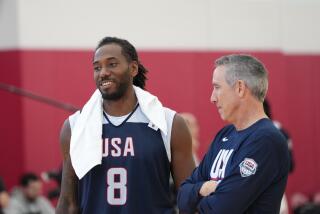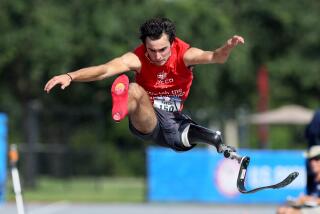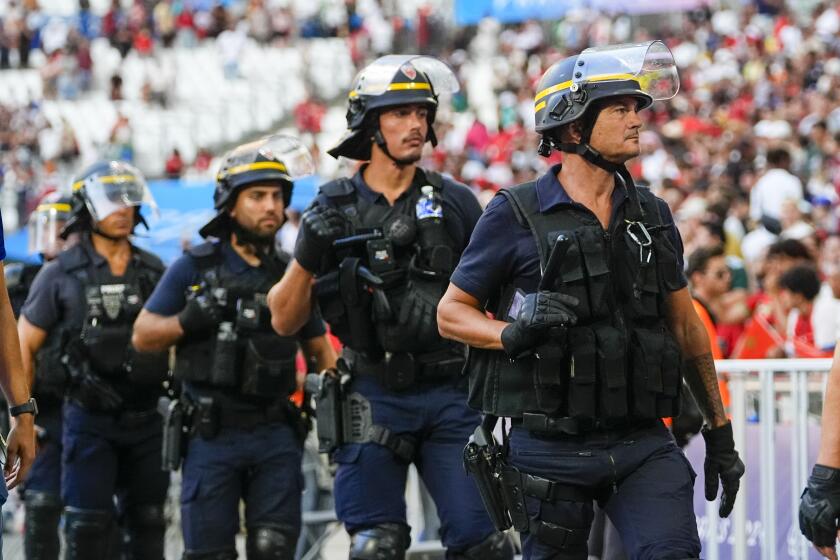No Russian evolution
Evgeni Plushenko and his coach, Alexei Mishin, carped all week about men’s skaters who do not attempt a quadruple jump, insisting such athletes are Neanderthals taking the sport back to the Pleistocene Epoch.
Using that argument in their graceless derision of Evan Lysacek’s Olympic victory, the first without a quad since 1994, the Russians missed the ironic truth that Plushenko was the outdated one.
They figured Plushenko could win again by the rules that applied when he became Olympic champion in 2006, but the particulars in the way the sport is judged have changed substantially. The judges now put a more even emphasis on all elements of a program -- jumps, spins and choreography -- as well as what a skater does between them.
There was a further irony. After losing Thursday night, Plushenko said that without the quad, the sport might as well be dancing. But he hardly exemplified that macho posture during his free skate.
Had Plushenko been man enough to do a second successful quad, he easily would have overcome the tiny margin -- 1.31 points -- by which Lysacek won. Had Plushenko not omitted something far simpler, the double loop jump planned for the end of his quad-triple combination, he would have won.
Had Plushenko put more of his jumps in the second half of the program, which the system rewards with a 10% bonus, he would have won. Instead, he gave a classically wimpy Russian men’s performance -- all the hard stuff in the beginning, then a lot of hanging around, hoping the big jumps early would be enough. Lysacek got the bonus on eight of his 12 jumps, Plushenko on four of his 11.
The Russians’ reaction to the outcome -- even the chairman of the Russian parliament’s upper house, Sergei Mironov, chimed in, asking for questions to be raised over “such refereeing” -- showed their ignorance of the judging system’s nuances.
Plushenko all but admitted that in one of his Thursday jibes at Lysacek.
“I think we need to change the judging system,” Plushenko said. “If the Olympic champion doesn’t know how to jump quad, it’s not men’s figure skating, it’s dancing.”
So Plushenko did what he had always done, constructing a free skate that Lysacek’s coach, Frank Carroll, called a “6.0 program.” That meant Carroll thought it belonged to the era before the International Skating Union implemented the new judging system in an effort to solve the problem that led to the 2002 Olympic pairs scandal.
At 27, coming back to competition after three years of injuries and the good life, Plushenko clearly lacked the stamina to do more.
At least three of his jumps, including the quad, were shaky. One of his three spins was a mess. His footwork included a lot of posing. He figured hip swivels and pelvic gyrations counted as the transitional pieces the new system demands.
“Anyone who is arguing with those judges’ scores, I don’t think understands the system,” Lysacek said. “They did a good job using the new judging system to score this event as accurately as possible.”
Yet more irony: Lysacek won not on the basis of higher component scores, a convenient way for judges to prop up skaters who are weaker technically, but on the execution of the program’s 13 elements: eight jumping passes, three spins, two footwork sequences.
If there is a gripe about the judges, it should center on how they gave Plushenko’s artistically inferior performance the same component scores as Lysacek’s.
Trailing by 0.55 after the short program, Lysacek made it up in the free skate with an advantage of 1.26 points on spins and 0.9 on footwork. The quality of Lysacek’s jumps -- including eight triples -- was good enough that he lost only 0.3 points there to Plushenko, who did the quad-triple combination and seven other triples.
“I think Evgeni went up and down,” Carroll said. “Brilliant jumping and then down. Evan stayed on a plane from the start to the finish. That consistent plane and getting the pluses [for execution], it adds up.”
Lysacek took the high road as he embarked on a whirlwind tour that included Friday appearances on Oprah and NBC’s “Today” show. He relentlessly praised Plushenko for his guts in making the comeback and the quality of his skating.
But Lysacek told the Chicago Tribune late Thursday night he was disappointed in Plushenko’s churlish responses to defeat.
“I guess I was a little disappointed that someone that was my role model would take a hit at me in probably one of the most special moments of my life, that I will never forget, regardless of what anyone says,” he said.
Lysacek also knows the Russians won’t forget. So although he intends to keep competing for “at least another year,” he is unlikely to be at the next Olympics in Sochi, Russia.
“I don’t think they would love to see me there, to be quite honest, if I could somehow get a visa into that country,” Lysacek joked Friday morning.
The Russians still are seeing things the way they were, when judges from communist countries showed unswerving fealty to their Moscow masters. For all the talk of jumps moving the sport forward, what they really want is a return to the Soviet era.
Times staff writer Sergei L. Loiko in Moscow contributed to this report.
More to Read
Go beyond the scoreboard
Get the latest on L.A.'s teams in the daily Sports Report newsletter.
You may occasionally receive promotional content from the Los Angeles Times.







